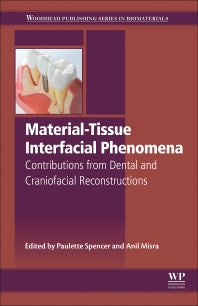Freshly Printed - allow 10 days lead
Couldn't load pickup availability
Material-Tissue Interfacial Phenomena
Contributions from Dental and Craniofacial Reconstructions
This comprehensive book explores the topic of material-tissue interfacial phenomena using dental and craniofacial reconstructions as a model system
Paulette Spencer (Edited by), Anil Misra (Edited by)
9780081003305, Elsevier Science
Hardback, published 13 October 2016
382 pages
22.9 x 15.1 x 2.6 cm, 0.73 kg
Material-Tissue Interfacial Phenomena: Contributions from Dental and Craniofacial Reconstructions explores the material/tissue interfacial phenomena using dental and craniofacial reconstructions as a model system. As the mouth is a particularly caustic environment, the synthetic and/or bio-enabled materials used to repair damaged tissues and restore form, function, and esthetics to oral structures must resist a variety of physical, chemical, and mechanical challenges. These challenges are magnified at the interface between dissimilar structures such as the tooth/material interface. Interfacial reactions at the atomic, molecular, and nano-scales initiate the failure of materials used to repair, restore, and reconstruct dental and craniofacial tissues. Understanding the phenomena that lead to failure at the interface between dissimilar structures, such as synthetic materials and biologic tissues, is confounded by a variety of factors that are thoroughly discussed in this comprehensive book.
Part One. Dental and craniofacial reconstructions using biomaterials 1. Clinical presentation: Reconstruction using composite materials 2. Reconstructions using alloys and ceramics 3. Interfaces in fixed dental prostheses: Challenges and opportunities Part Two. Fundamental structure/property characteristics 4. Fundamentals of the material-tissue interface in dental reconstructions: Structure/property relationships and characterization 5. Understanding the mechanical behavior of the material–tissue and material–material interface in dental reconstructions 6. Understanding the chemistry and improving the durability of dental resin–dentin bonded interface 7. Biology of the oral environment and its impact on the stability of dental and craniofacial reconstructions Part Three. Characterization of material-tissue interfaces in dental and craniofacial reconstructions 8. Morphologic and structural analysis of material-tissue interfaces relevant to dental reconstruction 9. Analyses of material-tissue interfaces by Fourier transform infrared, Raman spectroscopy, and chemometrics 10. Material-tissue interfacial phenomena: Challenges in mathematical modeling Part Four. Lessons learned: next generation reconstructions and future opportunities 11. Dentinoenamel junction: Motif for interfacial mechanics of dissimilar materials 12. Chimeric biomolecules: Biomolecular recognition–based self-organization at the bio-material interfaces 13. Stem cells and dental tissue reconstruction
Subject Areas: Biomedical engineering [MQW], Medical equipment & techniques [MBG]


